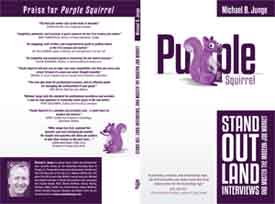Book Bag: Are You A ‘Purple Squirrel?’
 Mike Junge, Google’s senior recruiter and five time recruiter of the year-award winner, has written his first book, Purple Squirrel. The book covers topics including, strategic job searching, standing out and salary negotiations in this tough economy and digital age. Women For Hire talked to him.
Mike Junge, Google’s senior recruiter and five time recruiter of the year-award winner, has written his first book, Purple Squirrel. The book covers topics including, strategic job searching, standing out and salary negotiations in this tough economy and digital age. Women For Hire talked to him.
Who or what is a purple squirrel?
According to Wikipedia, a purple squirrel is “an unlikely job candidate with precisely the right education, experience, and qualifications that perfectly fits a job’s multifaceted requirements.”
I like to expand the definition a bit and include people who stand out from the competition by being uncommonly magnetic or adept at demonstrating value via an online profile. To me, anyone who knows how to grab the attention of talent hunters, excel through the hiring process, and make a real on-the-job difference can be considered a purple squirrel.
What can a jobseeker do if, quite frankly, her skills aren’t out of the ordinary and she’s searching diligently for work? Does everyone really have to be a rockstar today to get hired?
Great question! A big part of why I wrote the book is to help regular people stand out in a job search. The title Purple Squirrel really points to the idea that it’s possible for anyone to catch the attention of employers and develop job search skills that are distinctly valuable in the digital age. Understanding the mindset, motivation, and tools employed by talent hunters is a big part of the equation, but there’s a lot a job seeker can do on her side as well.
One of the first keys is to define her direction. The online world is so full of information and opportunity that it’s easy to get lost and distracted. Most job seekers waste a huge amount of time on ineffective or inefficient activities, and that’s doubly damaging in the high speed digital world. Getting clear about the sort of job she wants and what it will take to land that type of position makes it possible to be far more effective in the rest of the process.
Once her goal has been defined, it’s much easier to do targeted research on the specific skills and attributes desired by employees in that space. To a large extent, research can be as simple as reading relevant job descriptions and paying attention to the qualifications, words, and phrases that consistently show up. Once she knows how her audience defines what they want, she has a much better chance of writing a resume and building an online profile that demands their attention and compels them to follow up.
After getting into the hiring process it’s all about keeping the focus on the goals of the individual interviewers. Every one you meet is likely to have slightly different hopes and expectations for a new hire, and it’s a good idea to understand what those are at the beginning of the conversation. This improves the odds of keeping the rest of the meeting relevant and useful, which in turn improves the odds of converting interviews into offers. This is good.

What are some of the great things someone can do while out of work to stay current and relevant while searching for theperfect position?
Creating passion projects and volunteering for charity are my favorites. Work doesn’t necessarily have to be paid to be attention-grabbing and useful, especially if it generates references, work samples, and real world relationships.
If an applicant has documentation that shows she’s been doing useful and relevant things, that can go a long way to closing perceived gaps in employment history. It also keeps her skills sharp, and that’s very likely to come in handy in the interview process.
Education, training, certifications, and internships can be great as well. Keeping engaged at that level shows motivation, dedication, and a willingness to invest in improvement. Anything that builds skill, knowledge, and credibility is likely to have a positive impact on job search and career prospects.
Which three questions should everyone be prepared to answer and why?
Rather than focus on any questions in specific, I’d really guide a job seeker to go into the interview process as a complete and total expert on her own background and experience.
She should be prepared to talk in detail not only about the things she’s done, but also the how and why, what worked and what didn’t, what she’s learned, and what she might do differently the next time around.
The more comfortable and confident she is with the material on her resume, and the more prepared she is to speak about her skills and experience, the more likely she is to provide value to an interviewer. That’s a big part of moving from conversation to offer, which is the real goal.
Anything that specifically relates to the job at hand is always fair game as well, so it’s a good idea to do a line-by-line reading of the description and be prepared to address the core requirements of the position. It can make a huge difference to spend a few extra minutes brushing up on relevant topics, especially in areas that may be a bit rusty. In a close competition, those little things can really add up.
How does someone kill her chances during the first interview — perhaps even the phone screen — and how can she avoid that trap?
If her understanding of the position is different from that of the interviewer, a job seeker can go through an entire conversation without ever focusing on the aspects of her skills and experience most relevant to the other person. It’s a huge missed opportunity.
A great way to keep an interview conversation on target is to say something like “my understanding is that this position will be focused on X, but I’d be very interested to hear your perspective on the role” – OR – “before we get started, I’d love to hear your thoughts on what the right applicant will bring to the position.” There are a hundred ways to broach the subject, but getting the interviewer to share their perspective early on can be a real game-changer.
Finally, if you remember nothing else about job searching, remember to…..
Build your resume and online profile with “findability” as a primary goal.
Those on the other side of the hiring equation have to sort through an almost unlimited pool of potential resources and focus their energy on a much smaller number of high probability applicants. How do they find them? Usually by going to a website, database, or search engine and defining parameters for what would be considered a relevant prospect.
When the results come back, they scan to see who fits best and decide whether or not to take action. Key words, phrases, locations, titles, and dates play heavily into the equation, and the right combination can make a profile almost irresistible to a resume reader.
The more you understand the search parameters and objectives of talent hunters in your particular domain, the more likely you are to create a profile that catches their attention and compels them to take action.
As readers have discovered, it’s a lot more fun to be pursued by motivated employers than to be stuck in a cycle of chasing jobs. That’s why becoming an Opportunity Magnet is such a central theme to Purple Squirrel, and why so much of the second section is focused just on the art of resume writing and profile building.

Submit a Comment